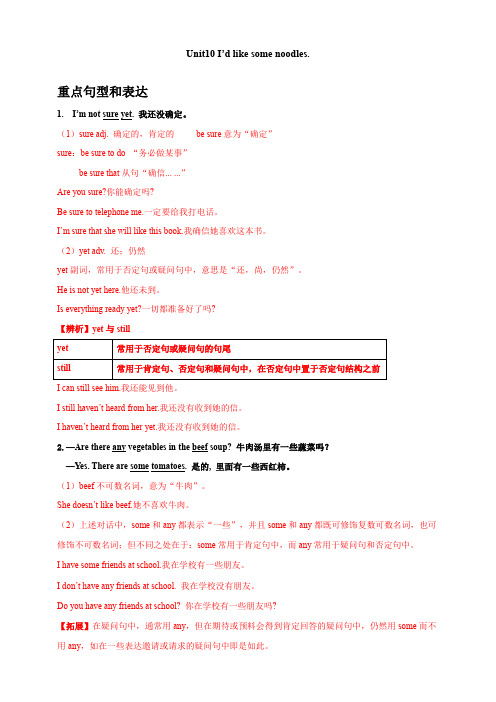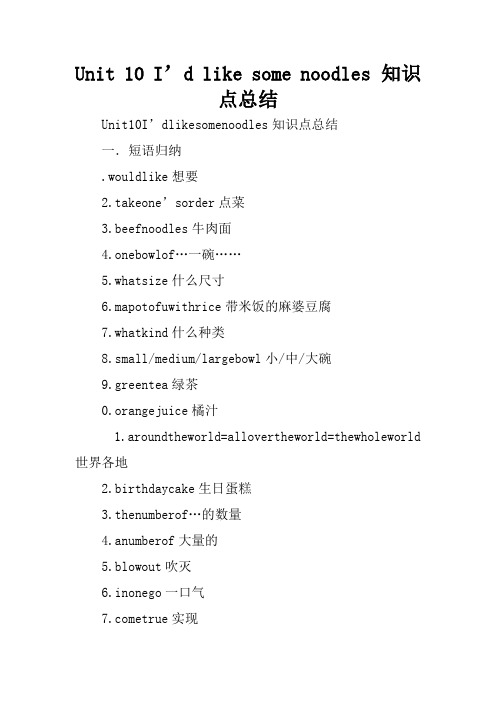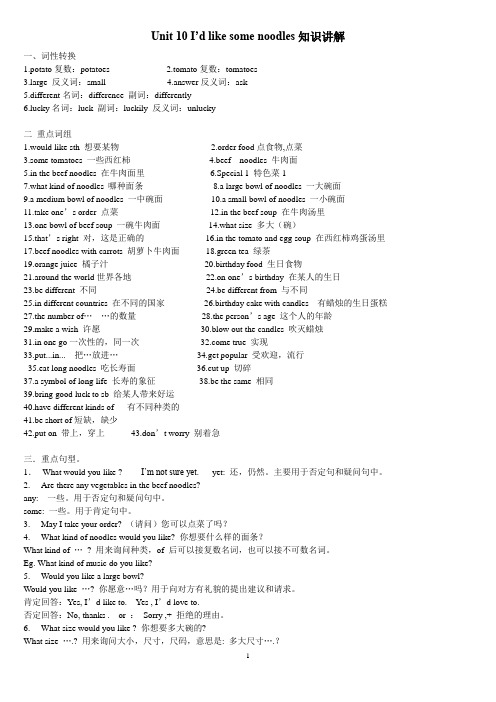16Unit 10 I'd like some noodles词句精讲精练
- 格式:doc
- 大小:38.20 KB
- 文档页数:7

Unit10 I’d like some noodles.重点句型和表达1. I’m not sure yet. 我还没确定。
(1)sure adj. 确定的,肯定的be sure意为“确定”sure:be sure to do “务必做某事”be sure that从句“确信... ...”Are you sure?你能确定吗?Be sure to telephone me.一定要给我打电话。
I’m sure that she will like this book.我确信她喜欢这本书。
(2)yet adv. 还;仍然yet副词,常用于否定句或疑问句中,意思是“还,尚,仍然”。
He is not yet here.他还未到。
Is everything ready yet?一切都准备好了吗?【辨析】yet与stillI can still see him.我还能见到他。
I still haven’t heard from her.我还没有收到她的信。
I haven’t heard from her yet.我还没有收到她的信。
2.—Are there any vegetables in the beef soup? 牛肉汤里有一些蔬菜吗?—Yes. There are some tomatoes. 是的, 里面有一些西红柿。
(1)beef不可数名词,意为“牛肉”。
She doesn’t like beef.她不喜欢牛肉。
(2)上述对话中,some和any都表示“一些”,并且some和any都既可修饰复数可数名词,也可修饰不可数名词;但不同之处在于:some常用于肯定句中,而any常用于疑问句和否定句中。
I have some friends at school.我在学校有一些朋友。
I don’t have any friends at school. 我在学校没有朋友。
Do you have any friends at school? 你在学校有一些朋友吗?【拓展】在疑问句中,通常用any,但在期待或预料会得到肯定回答的疑问句中,仍然用some而不用any,如在一些表达邀请或请求的疑问句中即是如此。


Unit 10 I’d like some noodles 知识点总结Unit10I’dlikesomenoodles知识点总结一.短语归纳.wouldlike想要2.takeone’sorder点菜3.beefnoodles牛肉面4.onebowlof…一碗……5.whatsize什么尺寸6.mapotofuwithrice带米饭的麻婆豆腐7.whatkind什么种类8.small/medium/largebowl小/中/大碗9.greentea绿茶0.orangejuice橘汁1.aroundtheworld=allovertheworld=thewholeworld 世界各地2.birthdaycake生日蛋糕3.thenumberof…的数量4.anumberof大量的5.blowout吹灭6.inonego一口气etrue实现8.cutup切碎9.makeawish许个愿望20.asymboloflonglife长寿的象征21.bringgoodlucktosb.给某人带来好运二.用法集萃1.wouldlike+sth.想要某物2.wouldlike+todosth.想要做某事3.whydon’tyou+dosth.?何不做某事?4.thenumberof+1.Arethereanyvegetablesinthebeefnoodl es?名词复数……的数量,anumberof+牛肉汤里有蔬菜吗?名词复数许多……2.whatkindofnoodleswouldyoulike?你想要哪种面条?3.I’dlikebeefnoodles,please.我想要牛肉面。
4.mayItakeyourorder?请问您可以点菜了吗?5.whatsizewouldyoulike?你想要多大的?6.we’dalsolikegongbaochickenandsomemapotofuwithrice.我们还要宫保鸡丁和一些带有米饭的麻婆豆腐。

Unit 10 I’d like some noodles知识讲解一、词性转换1.potato复数:potatoes2.tomato复数:tomatoesrge 反义词:small4.answer反义词:ask5.different名词:difference 副词:differently6.lucky名词:luck 副词:luckily 反义词:unlucky二重点词组1.would like sth 想要某物2.order food点食物,点菜3.some tomatoes 一些西红柿4.beef noodles 牛肉面5.in the beef noodles 在牛肉面里6.Special 1 特色菜17.what kind of noodles 哪种面条8.a large bowl of noodles 一大碗面9.a medium bowl of noodles 一中碗面10.a small bowl of noodles 一小碗面11.take one’s order 点菜12.in the beef soup 在牛肉汤里13.one bowl of beef soup 一碗牛肉面14.what size 多大(碗)15.that’s right 对,这是正确的16.in the tomato and egg soup 在西红柿鸡蛋汤里17.beef noodles with carrots 胡萝卜牛肉面18.green tea 绿茶19.orange juice 橘子汁20.birthday food 生日食物21.around the world世界各地22.on one’s birthday 在某人的生日23.be different 不同24.be different from 与不同25.in different countries 在不同的国家26.birthday cake with candles 有蜡烛的生日蛋糕27.the number of……的数量28.the person’s age 这个人的年龄29.make a wish 许愿30.blow out the candles 吹灭蜡烛31.in one go一次性的,同一次e true 实现33.put...in... 把…放进…34.get popular 受欢迎,流行35.eat long noodles 吃长寿面36.cut up 切碎37.a symbol of long life 长寿的象征38.be the same 相同39.bring good luck to sb 给某人带来好运40.have different kinds of 有不同种类的41.be short of短缺,缺少42.put on 带上,穿上43.don’t worry 别着急三.重点句型。

人教版英语七年级下册Unit 10知识清单及练习一、必背短语及搭配1.would like + n. 想要… = want + n.2.would like to do 想要做某事= want to do3.take one’s order 为某人点菜4.one large bowl of… 一大碗…5.around the world 世界各地6.make a wish 许愿7.blow out 吹灭8.in one go 一口气,一次性地e true 实现10.get popular 变得流行11.cut up 切碎12. a symbol of long life 长寿的象征13.bring good luck to sb. 给某人带来好运bring sth. to sb.14.make sb. do 让某人做某事15.be short of… 缺少…16.put on 戴上,穿上17.ask (sb.) for sth. (向某人)寻求…二、知识点辨析the number of… / a number of…1. the number of…“…的数量”the number of +名词复数+动词单数The number of students in our class is 50.2. a number of… “大量的…”a number of +名词复数+动词复数 A number of students in our class are going to the park.三、单元练习1. Look! Two ________ are playing basketball in the playground.A. man teacherB. man teachersC. men teacherD. men teachers2. My daughter likes to eat dumplings ________ noodles. She doesn’t like cooking ________ swimming.A. and; andB. and; orC. or; orD. or; and3. He left school and began to work ________ twelve.A. at the age ofB. at the beginning ofC. at the top ofD. at the bottom of4. The number of ________ in our class ________ fifty.A. student; isB. student; areC. students; isD. students; are5. This cup is too small. Do you have a ________ one?A. cleanB. largeC. roundD. new6. There isn’t ________ tea in this glass, but there’s ________ in that one.A. some; someB. any; anyC. some; anyD. any; some7. I ________ English with Mike now.A. readsB. is readingC. readD. am reading8. If we ________ take environmental problems seriously, the earth ________ worse and worse.A. don’t; won’t beB. won’t; isn’tC. won’t; isD. don’t; will be9. Peter may come with us tonight, but he isn’t sure ________.A. yetB. againC. eitherD. soon10. Is there any ________ in the soup?A. carrotB. cabbageC. potatoD. mutton11. I’d like ________ an action movie.A. seeB.to seeC. seeingD. watch12. — Do you have ________ beef? —Sorry, we don’t. But we have ________ mutton.A. any; someB. any; anyC. some; anyD. some; some13. Do you like noodles ________ chicken?A. withB. ofC. inD. to14. I think there are ________ in the fridge (冰箱).A. four boxes of milksB. four box of milksC. four boxes of milkD. four box of milk15. Please give ________ a bowl of ________.A. him; porridgesB. she; porridgeC. her; porridgeD. me; porridges16. ________ can you bring here tomorrow?A. How many breadB. How many breadsC. How much breadD. How much breads17. — ________ do you take? — I take a size 37 in shoes.A. What sizeB. Which sizeC. What largeD. How large18. — May I take your order? — ________.A. That’ll be 100 yuanB. Yes, that’s rightC. Yes, I’d like gongbao chickenD. Large, please19. — May I take your order, please?— I ________ some mapo tofu with rice, please.A. want toB. wantsC. would likeD. would like to20. Jerry’s mother plants a lot of ________ in her garden. They are delicious.A. chickenB. appleC. strawberriesD. vegetable21. I would like to buy some ________ and ________ for lunch.A. vegetable; meatB. potato; beefC. tomatoes; eggsD. chickens; cabbage22. I’d like some chicken and vegetables ________ rice.A. withB. hasC. haveD. or23. — What kind of noodles would you like? — ________.A. Mutton and tomatoes noodles B Mutton and tomato noodlesC. Mutton and tomatoes noodleD. Muttons and tomato noodles24. Welcome to the ________ restaurant! We have different ________.A. noodle; noodlesB. noodles; noodleC. noodle; noodleD. noodles; noodles25. — Would you like ________ football with us? — Certainly. I like ________ football very muchA. play; to playB. playing; to playC. to play; playingD. playing; playing26. Mr. Li orders us ________ the classroom quickly.A. leaveB. to leaveC. leavesD. leaving27. My little brother doesn’t like tomatoes ________ beef.A. andB. orC. butD. also28. — What would you like? —I’d like ________.A. a glass of milkB. two glass of milkC. a glass milkD. two glass of milks29. Would you like ________?A. eat somethingB. anything eatC. something to eatD. anything to eat30. Some bananas ________ in the bag. Some mutton ________ on the table.A. are; areB. is; isC. are; isD. is; are31. At the House of Dumplings, one of the specials has beef and onions, and is just 10 yuan ________ 15 dumplings.A. toB. atC. ofD. for32. Would you please ________ smoke here?A. notB. not toC. don’tD.to not33. — The students of Grade 9 in Changchun have to take part in the P.E test.— Yes. ________ you want to pass it and be stronger, practice more.A. UntilB. IfC. UnlessD. Or34. — Would you like something to drink? —________. I’d l ike a cup of tea.A. Yes, pleaseB. No, thanksC. Yes, I wouldD. No, I don’t35. I want to ________ in front of my birthday cake and I hope it can come true.A. make a wishB. take a showerC. make friendsD. take a walk36. You can’t tell him our phone number ________.A. stillB. justC. yetD. too37. — How much did you pay ________ that house? — Two thousand dollars.A. ofB. toC. aboutD. for38. Two cups of orange juice ________ only $15.A. isB. areC. inD. with39. — Does he like beef? — Yes, he does. He likes ________ a lot.A. itB. themC. theyD. one40. Anna, please ________ the meat and then cook it.A. cut upB. blow outC. cut downD. eat out41. I’m afraid I’m a little ________ money this month.A. short forB. short ofC. for shortD. in short42. — May I take your order, sir? — ________.A. Chicken with vegetables and two bowls of ricesB. Chicken with vegetables and two bowls of riceC. Chickens with vegetable and two bowl of ricesD. Chickens with vegetables and two bowls of rices43. There ________ a number of books in the library and the number of them ________ increasing.A. has; isB. have; areC. are; isD. is; are44. If it ________ tomorrow, we will go hiking at Cool City Park.A. not rainB. doesn’t rainC. won’t rainD. don’t rain45. — Would you like to eat some ________? — Yes, just a little.A, noodles B. rice C. dumplings D. juice46. She’d like ________ a cup of tea with milk.A. drinkB. drinksC. to drinkD. drinking47. There ________ some beef on the table.A. haveB. areC. isD. has48. — Can I help you? — Yes, I want some ________ and two pears.A. beefB. potatoC. noodleD. cabbage49. What ________ bowl of porridge would you like?A. kindB. sizeC. colorD. time50. He’d like ________ a cup of milk.A. drinkB. drinksC. to drinkD. drinking。

Unit 10 I'd like some noodles 一、单词1、noodle ['nuːd(ə)l] 面条2、mutton ['mʌt(ə)n] 羊肉3、beef [biːf] 牛肉4、cabbage [ˈkæbɪdʒ] 卷心菜;洋白菜5、potato [pə'teɪtəʊ] 土豆;马铃薯6、special ['speʃ(ə)l] 特色菜;特价品;特别的;特殊的7、would [wʊd; wəd] (表示意愿)愿意8、would like愿意;喜欢9、yet(常用于否定句或疑问句)还;仍然10、large[lɑːdʒ]大号的;大的11、order ['ɔːdə] 点菜;命令12、take one's order点菜13、size [saɪz] 大小;尺码14、bowl[bəʊl] 碗15、one(large)bowl of一(大)碗16、tofu ['təʊfuː] 豆腐17、meat [miːt] (可食用的)肉18、dumpling ['dʌmplɪŋ] 饺子19、porridge ['pɒrɪdʒ] 粥;面糊20、onion ['ʌnjən] 洋葱21、fish [fɪʃ] 鱼;鱼肉22、pancake ['pænkeɪk]烙饼;薄饼23、world [wɜːld] 世界24、around [ə'raʊnd] the world世界各地25、answer ['ɑːnsə] 答案;回答26、different ['dɪf(ə)r(ə)nt]不同的27、cake [keɪk] 蛋糕28、candle ['kænd(ə)l] 蜡烛29、age [eɪdʒ] 年龄30、make a wish [wɪʃ] 许愿31、blow [bləʊ] 吹32、blow out吹灭33、if如果34、will [wɪl] 会35、the UK(等于the United Kingdom)英国35、candy ['kændɪ] 糖果37、lucky幸运的38、popular受欢迎的;普遍的39、get popular受欢迎;流行40、cut up切碎41、idea [aɪ'dɪə] 想法;主意42、bring good luck[lʌk] to…给……带来好运二、短语1.orange juice 橙汁2. green tea 绿茶3. black tea 红茶4. around the world 全世界5. make a wish 许愿6. birthday cakes 生日蛋糕7. blow out the candles吹蜡烛8.the number of ……的数量9.cut up 切碎10.get popular 受欢迎11.the same(different) 相同(不同)12.bring good luck to 给……带来好运13. Pancake House 煎饼屋14. different kinds of 不同种类15. Don't worry!别担心!16.put on your glasses 戴上你的眼镜17.be short of 短缺三、语法1.would like意为“想要,愿意”,相当于want,用于提出要求或建议,但语气比want委婉,一般有以下三种形式:①would like sth.想要某物如:I would like some ice cream.我想要些冰淇淋。
Unit10I’d like some noodles知识详解及练习重点词汇:可数:noodles面条potatoes土豆tomatoes西红柿carrots胡萝卜vegetables蔬菜onions葱Dumplings:饺子pancakes:薄饼不可数:mutton羊肉beef牛肉meat肉porridge稀饭Soup汤milk:牛奶water水有时可数有时不可数:chicken鸡肉cabbage卷心菜fish鱼重点短语:would like:愿意,喜欢a large bowl of:一大碗two bowls of:两碗what kind of:哪种?Blow out:吹灭Make a wish:许愿around the world:世界各地Bring good luck to:给。
带来好运Cut up:切get popular:受欢迎重点句子:--What would you like?--I'd like beef noodles,please.--What kind of noodles would you like?--I'd like the beef noodles,please.May I take your order?我能为你点菜了吗?What size would you like?你想要多大的?I’d like a large bowl,please.重点用法:练:(1)Do you want________?A.speak EnglishB.to the new pantsC.ho homeD.to go to school(2)Would you like________(drink)some green tea?2.餐厅英语:--我能帮您吗?--Can can I do for you?=What would you like?--我想要一些面条。
--=I–like?(注意用“单数”)you like?(一中碗…) 3.--(接受)好的:--Yes,please.或Yes,I’d like/love to.(拒绝)不,谢谢。
Unit 10. I’d like some noodles语法:可数名词与不可数名词一.可数名词变复数的规则1)一般直接加s2)以s,x,sh,ch结尾的,加es3)以辅音字母加y结尾的,变y为i 加es4)以o 结尾的:无生命的加s ,有生命的加es5)部分不规则名词:大鹅老鼠齐步走,男男女女龇龇牙goose-- geese mouse-- mice man-- menwoman--women tooth--teeth foot-- feet6)单复数形式一致:一个中国人和一个日本人骑着一只羊和鹿去吃水煮鱼Chinese Japanese sheep deer fish7)以f或者fe结尾的:①直接加s海湾(gulf) 农奴(serf) 信(belief) 酋长(chief),悬崖(cliff) 证据(proof) 上顶(roof)房②加es小偷之妻生活难自己扫叶来做饭thief wife life self leaf忽见一狼躲架后拿刀把它劈两半Wolf shelf knife half③既可加s又可加es码头侏儒围围巾手绢复数变二心Wharf dwarf scarf handkerchief二.可数名词和不可数名词的量1.可数名词数词+可数名词数词+量词+of +可数名词复数数词+量词+of +不可数名词Many / some / any much / some / anyA lot of / lots of A lot of / lots ofA few / few a little / little1.would like sth 想要/喜欢某东西2.Yes,please 好的No.thanks 不,谢谢3.Would like to do sth= want to do sth 喜欢做某事,愿意做某事4.Yes,I’d love to.是的,我喜欢/ 我愿意/Yes ,I’d love to,but... 是的,我喜欢/ 我愿意,但是...5.Would like sb to do sth= want sb to do sth 想要某人做某事6.Beef soup 牛肉汤7.Green tea 绿茶8.Black tea 红茶9.Cabbage dumplings 卷心菜饺子10.Special 特殊的specials 特色菜,特价品on special 特价出售11.Be sure 确定12.What size 多大13.What size bowl of noodles would you like? 你想要多大碗的面条14.A large bowl of 一大碗15.A medium bowl of 一中碗16.A small bowl of 一小碗17.What kind 什么种类的18.What kind of noodles would you like ?你想要什么种类的面条19.Order sb to do sth 命令某人做某事20.In order to= in order that 为了21.Take one’s order= have one’s order 点菜22.May I take your order?= May I have your order? 请问你可以点菜了吗?23.In the beef soup 在牛肉汤里24.One bowl of beef soup 一碗牛肉汤rge,please 请来大碗的26.Mapo tofu with rice 带有米饭的麻婆豆腐27.There isn’t any 没有任何的。
Unit 10 I'd like some noodles课文重难点讲解【教师寄语】:You have to believe in yourself. That's the secret of success.? 人必须有自信,这是成功的秘密。
Section A1. I'd like some noodles【解析1】would v情态动词,表示意愿would like =want 想要(1) would like sth =want sth 想要某物I’d like some water now.(2) would like to do sth =want to do sth想去做某事I’d like to go swimming this weekend.(3) would like sb. to do sth=want sb. to do sth 想要某人去做某事She’d like me to help her .【解析2】—Would you like sth? 你想要什么吗?(用于用于有礼貌地、语气委婉地征求对方要求的用语)肯定回答:— Yes ,please否定回答:— No, thanks— Would you like some coffee?— No,thanks.【解析3】— Would you like to do sth ? 你愿意做某事吗?(用来相对方有礼貌地提出建议或邀请的句型)肯定回答:—Yes, I’d love/like to否定回答:—Sorry, I’m afraid…— Would you like to go shopping with me?—Yes, I’d like to ./ Sorry, I have to do my homework.( )①She’d like ____ tonight.A. going to the moviesB. go to the moviesC. to go to the movies( ) ②—Would you like _______ apples? — Yes, please.A. someB. anyC. many( ) ③— Would you like to eat beef noodles. — No, _________.A. Thank you.B. thanksC. all right.2. What kind of noodles would you like? 你想要哪种面条?【解析1】kind n 种类a kind of 一种的 all kinds of 各种各样的1。
U10 I’d like some noodles知识梳理一、知识梳理1.would like想要2. take one's order点菜3.blow out吹灭4.one(large) bowl of 一(大)碗5.what kind of 什么样的6.what size什么尺码7.cut up 切碎8.birthday cake生日蛋糕9.make a wish许个愿10. the UK英国11.get popular变得受欢迎12. around the world环游世界13.bring good luck to...给...带来好运二、重点句型1.-What kind of noodles would you like?I'd like beef noodles, please.2.-What size would you like?I'd like a large bowl, please.3. May I take your order?4. I'm not sure yet.5. I don't like onions, green tea or porridge.6. If he or she blows out all the candles in one go, the wish will come true.三、知识讲解及拓展延伸1.would like的句式和答语What would you like?你想要什么?What would+主语+ like?“某人想要什么?”。
would like意为“想要”,同want,但比want 语气更委婉。
-What would you like?你想要什么? -I'd like some tomatoes.我想要一些西红柿。
拓展延伸would like有两种常用句式:(1)Would you like sth.? 你想要某物吗?肯定回答语为“Yes,like sth.? 你please.”,否定答语为想要某物吗?否定答语“No, thanks.”(2)Would like to do sth.?你想要做某事吗?肯定答语为“Yes/Sure,I'd love to.”,否定回答通常为“I'd love to,but...”或“Sorry...”等还可以用“I have to..."说明原因。
Unit 10 I'd like some noodles词汇精讲1. potatopotato 可数名词,意为“土豆、马铃薯”,其复数形式为potatoes。
例如:I don’t like potatoes. 我不喜欢马铃薯。
注意:部分以字母o结尾的名词,变为复数时,在词尾加-es。
例如:tomato (西红柿) →tomatoes hero (英雄) →heroes Negro (黑人) →Negroes 我们可以用“黑人英雄爱吃西红柿和马铃薯”这个顺口溜来记住这几个词。
2. sizesize是名词,它的意思是“尺寸、大小”,既可以表示物体的大小,又可以表示服装、鞋帽的尺码、号码。
What size引导的特殊疑问句经常用来询问规格或者尺码。
例如:-What size shirt do you want? 你要多大号的衬衫?-I want size 36. 我要36号的。
3. small, medium&largesmall, medium, large都可以用来表示物体的型号,small是小号,medium是中号,large是大号。
这三个词可以放在表示量的词前做修饰,来说明具体的要求。
例如,a bowl of的意思是“一碗”,表示“大碗、中碗、小碗”时,分别在bowl前面加上“large, medium, small”即可。
例如:-What would you like? 您想要点什么?-I’d like a large bowl of beef noodles. 我要一大碗牛肉面。
4. special(1)special作名词时,意为“特色菜、特价品、特别的事物”等。
例如:The train is a special for the football game. 那班火车是为足球赛开的专车。
The menu changes regularly and there are daily specials to choose from.菜谱定期更换,而且每天都有特色菜供选择。
(2)special还可以做形容词,意为“特殊的, 特别的,特色的”。
His accent is quite special. 他的口音非常特别。
5. order(1)order 作名词,意为“点菜”,是可数名词;词组take one’s order意为“点菜”。
例如:May I take your order? 您现在点菜吗?拓展:order 作名词时,还可以表示“顺序、次序”。
例如:The names are in alphabetical order. 名字是按照字母顺序排列的。
My mother likes order in our home. 我的妈妈喜欢把家里布置的井井有条。
(2)order 作动词,意为“命令、要求、订购货物”等。
例如:The police ordered them to wait right there. 警察命令他们在那里等候。
Shall I order a taxi for you? 要我给你叫辆车吗?6. meatmeat 为不可数名词,是可食用的动物肉的总称,只能用some,any,a lot of等可以修饰不可数名词的量词修饰。
例如:There is some meat in the fridge. 冰箱里有一些肉。
注意:red meat 红色的肉(如牛肉等)white meat 白色肉类(如鸡肉等)meat 包括beef、chicken、mutton等,但不包括鱼类和鸟类的肉。
7. popularpopular是形容词,意为“流行的;受欢迎的”。
be popular with意为“受……欢迎”, get popular 意为“受欢迎,流行”。
例如:This kind of sweater is very popular. 这种毛衣非常流行。
She is a popular teacher in our school. 她是我们学校一位很受欢迎的老师。
His songs are popular with young people. 他的歌很受年轻人的欢迎。
In China, it is getting popular to have cake on your birthday.在中国,在生日的时候吃蛋糕变的很流行。
8. yet(1)yet作副词,意为“到此时,至今,还,尚未”,用于否定句中。
例如:We haven’t heard from him yet. 我们还没有收到他的来信。
I’m not yet sure if we could win. 我还没有把握确定我们是否能赢。
(2)yet作副词,意为“已经”,用于疑问句中。
例如:Is everything ready yet? 一切准备就绪了吗?Has the ship left yet? 轮船已经离开了吗?(3)yet作副词,意为“仍然,还是”,用于肯定句中。
例如:He’s yet a child. 他还是个孩子。
(4)yet作连词,意为“然而,可是”。
例如:You can draw a horse in five minutes, yet you kept me waiting for a year, why?你能在五分钟之内画好一匹马,然而你却让我等了一年,为什么?He trained hard all year, yet he didn’t win a prize in the competition.他全年都艰苦训练,然而在竞赛中却没能获奖。
9. differentdifferent 形容词,意为“不同的”。
其名词形式为“difference”。
The two answers are different. 这两个答案是不同的。
Can you tell me the differences between them? 你能告诉我他们的不同之处吗?be different from意为“与……不同”。
例如:Saying a thing is very different from doing it. 说一件事和做一件事很不相同。
10. fish(1)fish既可作可数名词,也可以作不可数名词。
用作可数名词指鱼的条数时,单复数相同。
例如:I bought two fish in the market. 我在市场买了两条鱼。
(2)fish用作可数名词指鱼的种类时,复数形式是fishes. 例如:There are many kinds of fishes in the lake. 湖里有许多种鱼。
(3)fish作不可数名词,意为“鱼肉”。
Do you like fish or eggs?你喜欢吃鱼肉还是鸡蛋?(4)fish 还可以作动词,意为“钓鱼”。
Let’s go fishing tomorrow. 让我们明天去钓鱼吧。
11. answer(1)answer 作可数名词,意为“答案、回答、答复”,后常接介词to表示“……的答案”。
例如:I don’t know the answer to the question. 我不知道这个问题的答案。
(2)answer 作动词时,既可以作及物动词,也可以做不及物动词。
作及物动词时意为“回答、答复、应答”;作不及物动词时意为“回答”。
例如:The boy can’t answer this question. 那个男孩回答不出问题。
(及物)He answered with a smile. 他微笑作答。
(不及物)12. blowblow 不及物动词,意为“吹”;词组blow out 意为“吹灭”。
out在这里是副词,和blow 构成动副关系;后接名词时,名词可以放在词组的中间也可以放在out的后面;后接代词时,代词必须放在词组的中间。
例如:The wind blew out the candle. 风吹灭了蜡烛。
The wind blew the match out. 风把火柴吹灭了。
The wind blew it out. 风把它吹灭了。
词汇精练Ⅰ. 汉译英。
1. 四片面包_________2. 两杯牛奶_________3. 五瓶水_________4. 四个苹果_________5. 两碗牛肉面________6. 五碗西红柿鸡蛋面__________ Ⅱ. 根据句意、汉语意思或首字母提示补全单词。
1. My pen is d_______ from yours.2. This piece of music is very p______; we all like it.3. This bowl is too small. That bowl is too large. I want a m______ one.4. Can you tell me the a_______ to the question?5. I want to swim in the water like a f_______.6. You’re a little heavy now. You’d better eat less (更少的) m______.7. -What would you like? -I am not sure y______.8. I’m a l______ man, because I get a good job.9. The fish s______ is very delicious.10. -What would you like to eat? -I’d like to eat some d _______.Ⅲ. 用括号中所给单词的适当形式填空。
1. Most men don’t like to go ______ (shop).2. The wind_______ (blow) hard now.3. I’d like _______ (order) a large bowl of beef noodles.4. The Pizza House has some great _______ (special).5. They would like _______ (potato) noodles.6. There are shoes of all _______ (size) in the supermarket.7. Everyone _______ (love) oranges. They are sweet and juicy.8. I don’t like eating _______ (orange), but I like to drink _______ (orange).9. She’d like some ________ (tomato), she doesn’t like _______ (strawberry).10. We have some _______ (fish) for lunch.Ⅳ.选词填空。